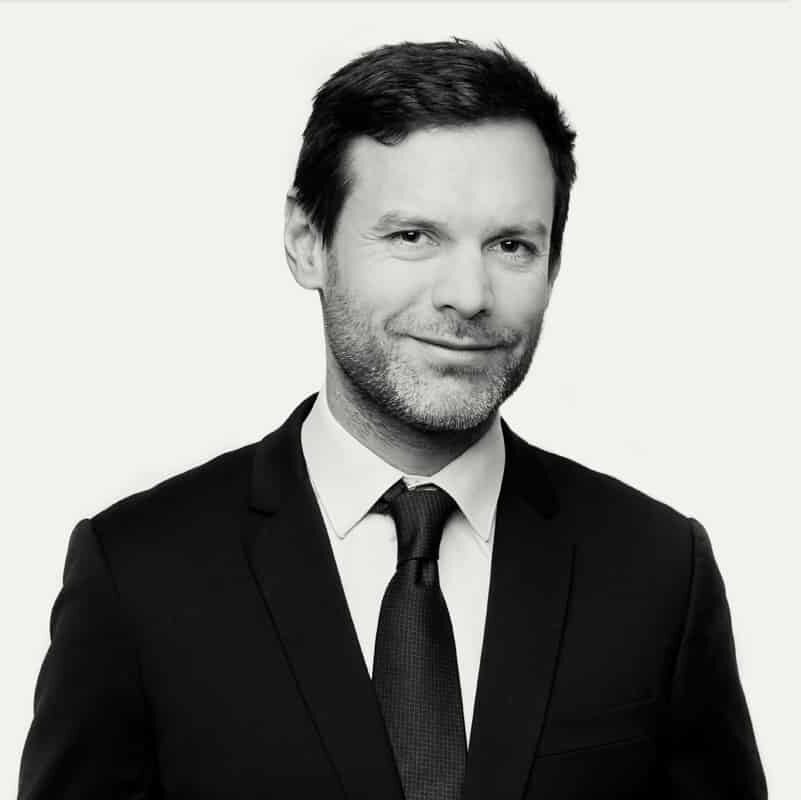Everywhere in Europe, founders spend a lot of time and energy raising funds. In France, however, some prefer to hire specialized investment banks to help them. We visited one such bank, Cambon Partners in the heart of Paris and talked to Romain Dehaussy about how he prepares startups to successfully raise funds from venture capital and private equity funds.

Partner, Cambon Partners
Romain Dehaussy is Partner at Cambon Partners, an independent investment bank founded in 2003 and headquartered in Paris. Cambon provides growth companies with advisory services in M&A, LBO and fundraisings and has conducted more than 350 transactions so far. The company employs around 45 professionals in Paris, London, San Francisco and Beijing. At Cambon, Romain focuses on fundraising for growth startups.
Why do the founders of French startups rely on investment banks such as Cambon Partners for fundraising instead of doing it themselves?
In France, hiring a team of experts to help raise funds is common. It is also a model that should be applied elsewhere in our biased opinion. As a founder, whenever there is an important decision to make, you should ask yourself how you can ensure an optimal outcome. Take the example of hiring your first VP of sales, a key hire. This person can make or break your company. To ensure the best outcome startups usually work together with hiring specialists.
Now I ask you: Is fundraising less important than hiring? Of course not. Funds don’t like fundraisers that much. Do you know why? Because advisors like us re-balance the power dynamic and increase fairness in negotiations and discussions. As an investor, you see the founders smile when they pitch. But as a fundraiser, you hear them cry, because they will tell you more than they tell their current investors. We spend a lot of time together at a crucial point in the development of their companies. That’s why we grow together with them, and why they trust us over the long term, and for different deals. Take the company Andjaro, for example, which Verve invested in as well. We worked with the founder Quentin Guilluy on three fundraising rounds so far. Interestingly enough, once funds are invested, they don’t object to a fundraiser for the next round, because it is in their very own interest to assure an optimal outcome. They are our main source of referrals.
What if a financing round fails?
If a financing round is successful, the entrepreneurs and investors get the fame. If the round craters, the fundraisers take all the blame. That’s just how it is. In that case, fundraisers also don’t earn money, because their compensation is to a very large extent tied to success. If you’d study the reasons why financing rounds fall apart, at Cambon, most of the time it is because the entrepreneurs promised more than what they could actually achieve over the 3 to 4 months we speak with the investors. At Cambon, we have a reputation to uphold. This is why we’re very selective about whom we work with.
“We’re making sure that if we reach out to investors with a new deal, they know it is something worth looking at.”
You’re declining potential clients?
Every single day. A part of our job is trying to understand what investors are looking for, and which startups have a good chance to raise serious amounts of money, in our case, from around 8 million euros up to more than 100 million. We’re making sure that if we reach out to investors with a new deal, they know it is something worth looking at. This is why much like a fund we try to be a very good filter.
What are the topics that currently get investors excited?
In 2022, VC funds will fight over every startup that somehow manages to position itself as “green” or “impactful”. To be honest, greenwashing is a strategy that could make sense for startups right now. As for the other hot topics, no surprises there. Big data, fintech, AI and the future of work, as HR tech is grandiloquently called today, are all things every investor wants to be exposed to, even if they all like to say about themselves that they’re not mainstream. Investors are herd animals, they like to be in company. And fundraisers are just mirroring this tendency. If your startup is doing something that doesn’t resonate with the mainstream, say, if you’re an adtech startup or developing hardware, then, sadly, it’s more difficult.
This year is supposed to be more difficult than last year for everyone that is raising funds, not just for startups building actual stuff. We see funds suddenly dropping out of financing rounds for no clear reason.
Those are probably the ones who don’t understand that you make money investing when valuations have come down to earth again. We don’t see that a lot. The start of the year was a bit slow, yes, but we estimate that French startups will raise 14 billion euros this year, up 40% from 2021.
That almost sounds like everything is fine. Some founders might disagree with that.
The only people who need to panic are those that raised money at absurd valuations last year and are now running out of cash quickly. Everyone else should stay calm and carry on, and stop dreaming about raising at 2021 valuations. And they should do the math. If you’re only able to raise 18 million at a 54 million valuation instead of raising 20 million at a 70 million valuation, the difference for you as a founder is negligible if you own 40% of the company prior to the round.

Invest in Startups
As one of Europe’s most active venture capital investors, we grant qualified private investors access to top-tier European startups. With investments starting at EUR/CHF 10’000, you can build your own tailored portfolio over time and diversify across stages and sectors.
To come back to the current situation, what does the M&A environment look like?
An interesting development is that more and more entrepreneurs are opting for a dual-track strategy now. This means they’re pursuing two options at the same time: raising funds while entering talks to sell the company. Having options is a good thing. Sometimes they start the fundraising process and then word gets out to a potential buyer who realizes this is the moment to put an offer on the table. This happens quite often, it’s a small world.
Can you walk me through the fundraising process from your perspective?
First comes the preparation stage. The founders will have several meetings with us where they explain what they do. We’ll do our own research to validate the points they make. The numbers in the business plan, are they justified? What assumptions are they based on, and are these assumptions realistic? Investors want to see reliable figures, but at the same time, they also want to hear a story that allows you to dream. So we’ll be working on these elements together. If an important part of the story is missing, say, the commercial traction in an important international market isn’t there yet, it might be wiser to address this issue head-on, and postpone the next stage for a few months until it is fixed. We spend days and nights over 4 to 8 weeks in order to craft the best documents possible.
Once you have all the convincing arguments in place, what comes next?
We’ll create a list of around 30-50 funds that fit the strategic needs of the startup. If, for example, a French startup wants to expand to the US or Germany, we’ll give funds from these countries an extra weight. It goes without saying that the startup in question also needs to fit the investment focus of the funds. This means that we spend a lot of time talking to funds to really understand how they tick, and following the media closely and analyzing what they invested in. Then we start the roadshow, which means that the founders start pitching their stories to individual funds. We provide the founders with extensive briefings about the investors profiles and what to say and what not.
What should they say and what not?
Don’t say your forecasts are conservative, people hate to hear that and won’t believe you. Stick to the logical order you have built your slide deck on and don’t get sidetracked by a question about a detail. Ban all acronyms and jargon from your language, especially if it is a technical topic the investors aren’t familiar with. Pay attention to your interlocutors and their reactions. And keep in mind that this is the first time the investor gets exposed to all of this information, so include a few slides in your presentation that allow the audience to take a quick mental break instead of trying to pack in as much information as possible.
And if they do a good job with their presentation and in the end receive an offer to invest in the form of a term sheet?
Assuming it’s a good offer with a fair valuation, then we’re very transparent with other investors, still interested, and tell them now is the time you also want to make an offer if they don’t want to miss the opportunity. This is where ideally, the fear of missing out comes into play and investors rush to get into a round that is considered hot. This is also a reason why it pays to be prudent with communicating how much you want to raise. If you say you want to raise 10 million, nothing prevents you from raising a bit more if you have good offers on the table. However, if you say you’re going to raise 20 million and end up raising only 14 million, you’re sending a bad signal to the market, because the funds will know that not enough investors bit at what you were offering.
With the offers on the table, your job is done?
Not just yet, no. We make sure the proceedings run smoothly, that the data room is in good order and that the legal work is done without friction. We help the lawyers with our experience and the financial perspective of the deal. The relationship between a fund and a startup lasts longer than the average marriage in Paris, so it’s important to get off to a good start.
Sometimes, founders have the opportunity to sell a few of the shares they own to new investors during a financing round. These so-called secondaries are getting more and more common, but some investors have reservations about them because this money does not flow to the company. What’s your position on this?
We see secondaries in the majority of transactions today. If you raise more than 10 million, secondaries are a healthy thing if the sums you’re taking off the table aren’t too big. As a founder, often you’ve quit a well-paid job and have been working day and night for years now on a small salary. That might have been fun for a while, but at one point, especially if you’re starting a family, a bit of money in the bank won’t hurt. I mean, I’ve talked to a founder who spent his weekends installing a kitchen all by himself to save some money. That doesn’t make sense, he should have been relaxing a bit instead.
“The goal is to make founders’ life a bit easier.”
When we talk about secondaries, how much is a healthy amount of money and when does it start to look greedy?
It depends. Where do the founders live, at which point in life are they, and how many children do they have to take care of? If you’re aiming to buy an apartment for your family and need a few hundred thousand, that seems fair, but if four founders want to cash out more than 1 million each, that might be a bit excessive, if they’re raising, say, less than 50 million euros. The goal is to make founders’ life a bit easier, but they should still be focused on creating more value with their startups.
Written by
WITH US, YOU CANCO-INVEST IN DEEP TECH STARTUPS

Verve's investor network
With annual investments of EUR 60-70 mio, we belong to the top 10% most active startup investors in Europe. We therefore get you into competitive financing rounds alongside other world-class venture capital funds.
We empower you to build your individual portfolio.
More News
02.08.2022
“I like to make founders successful”
Former tech entrepreneur Nicole Herzog prefers investing in startups rather than safe assets such as real estate. She argues that because entrepreneurs learn to cope with uncertainty and risk, they have a different mindset than traditional investors.
04.01.2021
Founders investing in founders:
Stefan Brunner
In this series, we portray successful founders that invest through Verve Ventures in the next generation of founders. We start with Stefan Brunner, who exited two companies already and is now an active business angel.
04.04.2020
How to help
a weak heart
In this interview, the renowned cardiac surgeon Thierry Carrel explains what happens when the heart becomes weak, what the different treatment options are and why the new approach from the startup Fineheart sounds promising.
Startups,Innovation andVenture Capital
Sign up to receive our weekly newsletter and learn about investing in technologies that are changing the world.




